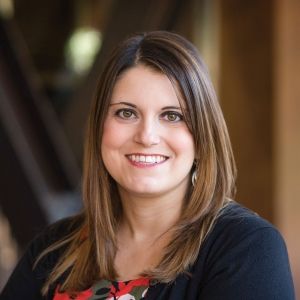
This is the last in a series of five Meet the Planner profiles, in which we get event planners’ insights on their jobs, their motivations, and their challenges — as well as their thoughts on venue and hotel interactions.

Planners don’t always have a choice.
That’s the struggle that Laura Vogel has when trying to book venues in hot destinations. “I can’t even get into San Diego because the associations have it booked for the next 12 years. And that’s the same problem in Austin, San Francisco, Orlando, Las Vegas,” she says. “As a corporate buyer who doesn’t have the ability to book 12 years out, I’m running into real challenges.”
With the difficulty securing space, Laura says, “most of the time, the (hotel or venue) decision is made for me because I have one option that’s available.”
A lot has changed during Laura’s more than 17 years as a corporate meeting planner and event consultant. She started out doing sales incentive trips but eventually tackled “any and every type of event” — conferences, road shows, trade shows, and even 3,000-person summits. Laura is experienced in every stage of the planning cycle, too, from venue sourcing to event marketing to logistics.
The industry has changed as well. Several years ago, events were on a downswing as the U.S. battled through a recession. “Now the challenge is that there’s too much business, and we can’t get in. So where do we place the business?” Laura asks.
She finds herself trying to book further in advance than her clients find comfortable. “I’m really putting a lot of pressure on the organization to book, and now we’ve booked too many rooms,” she says. “We’re seeing ourselves in an attrition situation because in order to get the meeting space that we need, we have to book the hotel rooms four years out, (and) we’re guessing” on how many will be required.
She hopes the solution is better collaboration with venues and hotels. “I think this is something we need to work on in the industry together,” she says. “How do we all work together to ensure that … everybody goes home happy?”
The RFP Process Is Like Job Hunting
The first steps, Laura says, are flexibility and transparency. “I hate when a hotelier just turns down an RFP. The best thing we can do is be flexible. Tell me when you can do it. Tell me what dates you could do. Tell me to increase my room block by 50 rooms,” she says. Then, she has an opportunity to see what adjustments are possible on her end.
Laura compares the RFP process to the job hunt. If an applicant’s résumé doesn’t match the requirements exactly in the system, the company rejects it. Instead, she says, if hotels “talk to me like I’m a person,” the outcomes will improve for all involved.
On those occasions that the hotel does turn down an RFP, Laura would just like to know why, so she can try to adjust. “If you’re going to turn it down, then I want to see a reason. Is it rooms-to-space (ratio)? Is it date? Do you have another group in house? … If every single meeting room in the hotel is booked, then … we’ll move on.”
Some Key Factors Remain a Mystery Until After Contract
When Laura does have the luxury of a choice of venues, she says the program’s three basic needs (obviously) come first: “Can you do the date? Are you in the right location? Are you ‘the right type’ of hotel” in regards to class?
After that, though, “it’s really about the space,” she says. “Does it lay out right? Does it look good? Does it feel like a good flow? Do the guest rooms look nice?” Sometimes, a tried-and-true brand can save some work. If an unknown city has a hotel in a chain that has given Laura good experiences elsewhere, “I’d probably search a little less, because if I could just go there, it makes my life a little easier.”
But no matter how key some factors are, Laura may not get the opportunity to test them before signing on the bottom line. The catering, for instance. “No one’s doing a pre-contract tasting,” she says. “(But food is) one of the top reasons people have a good experience.”
That just makes things a little more stressful for Laura and her team after the venue is chosen and booked. “We started doing two post-contracting site visits and putting a lot of pressure on tastings and planning (then). You just have to have a really strong logistical team,” she says.
Executives Don't Always Understand the Event Process and Costs
Another challenge that Laura has encountered is explaining her role and her limitations to corporate executives. “I understand the business, but a CEO does not,” she says. “A CEO doesn’t understand why I can’t get a $250 rate in San Diego for an event in two years. He doesn’t understand why I can’t even get a hotel in San Diego in two years.”
And then, explaining all those costs — $2 million to feed 3,000 attendees, $150 for a gallon of coffee, $250,000 for a big-name celebrity guest — especially when a female planner is in a room of male executives. “You want to project gravitas, and you’re spending a lot of the company’s money,” Laura says. “Sometimes the events are to generate leads, and sometimes the events are to generate money.
Sometimes they’re both,” she adds. “You’re tasked with multiple roles, but you’re also tasked with delivering phenomenal experience … . Delivering on all of those is very challenging, especially as it gets more and more expensive to host events.”
At the end of the day, though, it’s the experience that keeps Laura in the meetings and events industry. “It’s all about experience for me,” she says. “That excites me because I think, ‘It would be so cool to create this experience for these (clients), because that’s what they want to do.”
Creating that experience, though, takes teamwork. “I think most times, (hotels and venues) understand that we’re in this together,” she say. But the stronger that relationship can be, the better the experience for hoteliers, planners, and — most importantly — attendees.
More Meet the Planner
For Leanna Mosquera, Event Planning Is All in the Details
Jodi VanWoerkom Knows It’s Not Easy to Take Over a City






